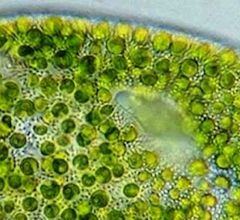Chlorella Pyrenoidosa
 Chlorella Pyrenoidosa is a freshwater single-cell alga, and thus it can be readily cultivated. It is closely related to Chlorella Vulgaris. Its cell is protected by hard cellulose that humans cannot digest, and therefore it must be processed for maximum health benefits.1,2
Chlorella Pyrenoidosa is a freshwater single-cell alga, and thus it can be readily cultivated. It is closely related to Chlorella Vulgaris. Its cell is protected by hard cellulose that humans cannot digest, and therefore it must be processed for maximum health benefits.1,2
In one experiment, researchers created a Chlorella Pyrenoidosa concentrate by enzymatically removing its outer wall, resulting in a 76% protein concentrate. This is a very high protein concentration for a non-animal-based food product. Additionally, it is also rich in Omega-3 fatty acids.1,2
Health Benefits of Chlorella Pyrenoidosa
Below are some of the well-known benefits of Chlorella Pyrenoidosa:
- Excellent Source of Vegan Protein
For vegans, obtaining a high-quality source of protein is always a challenge. However, it appears that Chlorella Pyrenoidosa can be an excellent source of vegan protein. Moreover, its production is quite simple to scale. This means that it could be an excellent sports supplement for vegans and non-vegans. Moreover, the ideal amino acid profile of Chlorella Pyrenoidosa means that it may be as good as whey protein or other animal-based protein sources.1,2 - Helps to Reduce Blood Pressure
Studies show that Chlorella Pyrenoidosa extract may help stabilise and even lower blood pressure. Although its impact is not very high, it may be suitable for those living with mild to moderate hypertension.3 - Good For Heart Health
One of the systemic reviews found that Chlorella supplementation may help reduce blood pressure and bad cholesterol. Chlorella Pyrenoidosa appears to be especially good for lowering LDL cholesterol, though it does not appear to have significant impact on triglycerides and HDL-cholesterol.4 - Lowers Blood Sugar
Chlorella Pyrenoidosa supplements may help reduce blood sugar levels and therefore may be good for those living with diabetes. A person may consume it as a health supplement in smaller amounts or much more significant amounts as a part of a balanced diet.3 It appears that Chlorella Pyrenoidosa assists due to its influence on gut function. Chlorella Pyrenoidosa also seems to be an excellent probiotic and may have a remarkable effect on microbiota.5 - Good For Immunity
Some polysaccharides in Chlorella Pyrenoidosa appear to possess potent immune-boosting properties. It may be especially good for increasing the production of immunoglobulins. Therefore, it may help fight seasonal infections. Further, it may have some anti-cancer activity.6,7 - Good For Eye Health
Chlorella Pyrenoidosa is an excellent source of some carotenoids, especially lutein, which is beneficial for eye health. Moreover, lutein does not cause side effects unlike consumption of high dose Vitamin A. Further, Chlorella Pyrenoidosa may be suitable for those at risk of age-related macular degeneration, a leading cause of blindness among older adults.8 - Liver Health
There is some indication that Chlorella Pyrenoidosa may help prevent non-alcoholic fatty liver disease. Chlorella Pyrenoidosa appears to increase fat removal from liver cells. It is quite probable that this action of Chlorella Pyrenoidosa may have a role in its cholesterol-lowering and blood sugar lowering action. However, it is worth noticing that most evidence comes from experimental studies in animal models, and there is still a need for further studies in humans.9
Side Effects of Chlorella Pyrenoidosa
There are no known specific side effects of Chlorella Pyrenoidosa, and it appears to be relatively safe. Nonetheless, some people may experience gastrointestinal distress or allergic reactions.
Properties
- Blood Pressure – Reduction3
- Cancer Prevention6,7
- Cholesterol3,5
- Diabetes / Blood Sugar3,5
- Eye Health8
- Heart Support / Health4
- High/Good Levels of Omega-3 Fatty Acids1,2
- High/Good Levels of Protein1,2
- Hypertension3
- Immune Booster6,7
- Liver Health9
- Probiotic1,2
- Toxin Removal1
References:
- Waghmare AG, Salve MK, LeBlanc JG, Arya SS. Concentration and characterization of microalgae proteins from Chlorella pyrenoidosa. Bioresour Bioprocess. 2016;3(1):1-11. doi:10.1186/s40643-016-0094-8
- Mathur M, Kumar A, Ariyadasa TU, Malik A. Yeast assisted algal flocculation for enhancing nutraceutical potential of Chlorella pyrenoidosa. Bioresour Technol. 2021;340:125670. doi:10.1016/j.biortech.2021.125670
- Merchant RE, Andre CA, Sica DA. Nutritional supplementation with Chlorella pyrenoidosa for mild to moderate hypertension. J Med Food. 2002;5(3):141-152. doi:10.1089/10966200260398170
- Fallah AA, Sarmast E, Habibian Dehkordi S, et al. Effect of Chlorella supplementation on cardiovascular risk factors: A meta-analysis of randomized controlled trials. Clin Nutr. 2018;37(6, Part A):1892-1901. doi:10.1016/j.clnu.2017.09.019
- Wan X, Li T, Zhong R, et al. Anti-diabetic activity of PUFAs-rich extracts of Chlorella pyrenoidosa and Spirulina platensis in rats. Food Chem Toxicol. 2019;128:233-239. doi:10.1016/j.fct.2019.04.017
- Yang F, Shi Y, Sheng J, Hu Q. In vivo immunomodulatory activity of polysaccharides derived from Chlorella pyrenoidosa. Eur Food Res Technol. 2006;224(2):225-228. doi:10.1007/s00217-006-0315-z
- Kanouchi H, Okabe M, Doi S, Yamada H, Tachibana H, Yamada K. Dietary effect of Chlorella pyrenoidosa powder on immunoglobulin productivity of sprague-dawley rats. Nippon Shokuhin Kagaku Kogaku Kaishi. 2001;48(8):634-636. doi:10.3136/nskkk.48.634
- Fan X-D, Hou Y, Huang X-X, Qiu T-Q, Jiang J-G. Ultrasound-Enhanced Subcritical CO2 Extraction of Lutein from Chlorella pyrenoidosa. J Agric Food Chem. 2015;63(18):4597-4605. doi:10.1021/acs.jafc.5b00461
- Zheng Y, Martin-Morales A, Wang J, Fujishima M, Okumura E, Sato K. Phenethylamine in chlorella alleviates high-fat diet-induced mouse liver damage by regulating generation of methylglyoxal. Npj Sci Food. 2021;5(1):22. doi:10.1038/s41538-021-00105-3
